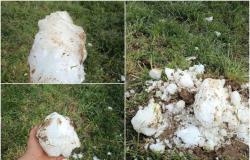Giedrimas Jeglinskas, the candidate nominated by the opposition Democratic Union “Vardan Lietuvos”, brought more than 18,000 votes to the CEC on Thursday. on paper signature sheets, he collected over 7 thousand signatures online. So he collected more than 26 thousand. people’s signatures. However, even if there are enough signatures, it does not mean that G. Jeglinskas will be able to participate in the presidential elections.
The constitution requires that the candidate has lived in Lithuania for the last three years. However, from February 2020 to October 2022, G. Jeglinskas declared his place of residence outside of Lithuania. At that time, he held the position of NATO Deputy Secretary General for Organizational Management.
G. Jeglinskas himself testified that the number of people who signed for him indicates that he is worthy of participating in the presidential elections.
“I believe that the CEC will make that decision. Not by politicking, but by taking into account the interests of the people of Lithuania and will make the right decision,” said G. Jeglinskas, a possible presidential candidate.
CEC opinions differ on these issues.
“Registration of all candidates will be decided at the CEC meeting, which CEC has to do by April 10,” said CEC chairman Lina Petronienė.
The team of independent candidate Igna Vēgėlė also brought signatures on Thursday. He collected over 15 thousand. of paper signatures and over 20 thousand online.
The team of Aurelijas Veryga, the candidate nominated by the opposition Lithuanian Peasants and Greens Union (LVŽS), also submitted signatures to the CEC on Thursday. He roared over 28 thousand. paper signatures and more than 8 thousand online.
Independent candidate Eduardas Vaitkus said that he collected over 15 thousand. paper signatures and more than 15 thousand. online.
Not all registered candidates managed to collect the required number of signatures. Gintautas Kniukšta presented a total of about 700 signatures on Thursday, and Valdas Tutkus also arrived at the CEC a few minutes before the end of signing. He collected a total of over 19 thousand. signatures, so he will not be able to participate in the presidential elections. Arūnas Rinkus did not collect the necessary signatures either.
For those who managed to collect signatures, the CEC promises to check them within 10 days.
“The signatures are first scanned so that we can determine whether there are duplicate signatures, voters who have signed multiple times, both on paper and electronically for the same candidate.
After scanning the voter’s signatures, duplicates are selected, and it is checked whether the voters have signed. Because not only citizens of the Republic of Lithuania live in Lithuania, they could possibly sign. That’s why the data is being checked”, said LNK chairman L. Petronienė to LNK news.
But Vilnius residents interviewed by LNK news assured that they do not expect much from the upcoming presidential elections.
Thus, President Gitanas Nausėda, who is seeking re-election, collected the most signatures, over 38 thousand, LVŽS representative A. Veryga, I. Vēgėlė, they collected 36 thousand each. of signatures, Prime Minister Ingrida Šimonytė collected 33 thousand. electronic signatures. Seimas member Remigijus Žemaitaitis collected 32 thousand. signatures, and E. Vaitkus – over 31 thousand. signatures.
As already mentioned, G. Jeglinskas collected over 26 thousand. of signatures, Labor Party leader Andrius Mazuronis collected almost 26 thousand. signatures, and the Freedom Party’s presidential candidate Dainius Žalimas collected 22 thousand. signatures.
Mykolas Romeris University (MRU) lecturer, political scientist Rima Urbonaitė told LNK news that the biggest intrigue is who will go to the second round of the presidential elections and face G. Nausėda.
“This is who will pass the bar in the second round of elections: will it be I. Šimonytė or I. Vēgėlė”, political scientist R. Urbonaitė shared her insights.
It is also unclear which rival could challenge G. Nausėda. Political scientist R. Urbonaitė says that in the second round of presidential elections, many voters do not vote for the candidate they like, but against the one they don’t like. Allegedly, this also happened in the last presidential election, when G. Nausėda celebrated his victory, after finishing second after the first round, he was overtaken by I. Šimonytė.
“Part simply voted against I. Šimonytė. And now it will be exactly the same whether it will be I. Šimonytė or I. Vēgėlė. Because there may be those who have never voted for G. Nausėdas, but will vote for him because they are against I. Vēgelės, there may be such people,” said R. Urbonaitė.
The first round of the presidential election will be held on May 12.
See the full LNK news report here:
Tags: phase presidential election begins collected signatures voters






